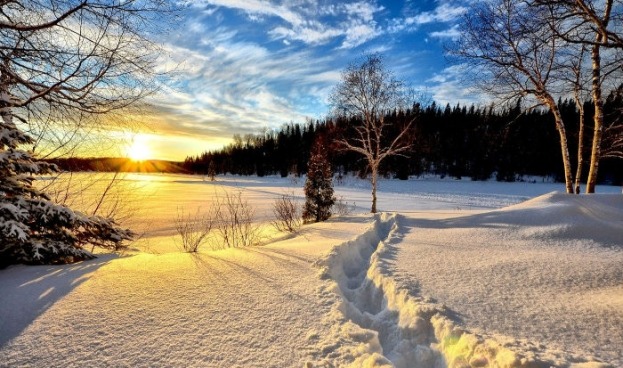"Our hearts grow tender with childhood memories . . . and we are better throughout the year for having, in spirit, become a child again at Christmas-time."
— Laura Ingalls Wilder, author of Little House on the Prairie
In "The Alphabet of Spiritual Literacy," W is for Wonder. And, for many of us, Christmas is the Season of Wonder: pageants and angels and stars and potluck dinners and knitted scarves fresh off the needles. Mesmerized by twinkling lights and Advent candles piercing the darkness, it would seem that wonder just happens, descending like the Angel Gabriel, announcing good tidings.
But hold on. For the introvert, Christmas heralds a nightmare of multiple social events packed into a short space of time. For the financially strapped, the pressure to buy presents that one can ill afford creates anxiety. For the recently bereaved, the hole in the grieving heart grows deeper; for the dysfunctional family, it all starts again, the automatic download of Dysfunction 2.0; for the perfectionist, the old bugaboo, "I'm not good enough" rears its ugly head over the most trivial things, like the inability to wrap a proper present (me). Yes, Christmas descends on us each year carrying delicate snowflakes and treacherous ice in equal measure.
So, with all the stresses of Christmas, how does wonder have a fighting chance? How can it reach us and do its magic when we are, like Martha, "distracted by many things" (Luke 10:41)?
It's not easy. As for me, it feels like I'm wading through the muddy waters of the Amazon or, to be honest, Amazon.com, brushing aside the overgrown branches of advertising and the thrill of 60% off sales that hit me in the face. But if I listen to my higher self — my better Christmas angels — I can just reach that shore of wonder. Sometimes. But it takes intentional practice.
Let me suggest two ways to practice wonder, especially during the Christmas season — simple practices that never fail to pull me out of the deep waters of commercialism and busyness, and safely back on shore.
Become a Child of Wonder
Think of a baby, any baby — your grandchild, perhaps. Each one is a fresh-born child of God, a little bundle of wonder — chock-full of divinity, possibility, and purity. Bruce Epperly captures this meaning of Christmas in a recent Process and Faith lectionary essay on Luke:
Mary the Mother, "treasured all these words and pondered them in her heart." Her first Child, born in economic and political unsettledness, is also a miracle and wonder. One of billions born in earth history, this Child tells us that every child comes "trailing clouds of glory" and every birthplace is a gateway to Divinity.
When people say, "Christmas is for children," they are right. But that includes us adults, if we can only get back to the child inside of us — that child of wonder for whom the whole world unfolds in fresh revelations of sheer amazement on a daily basis. For the truth is, we cannot fully embrace the practice of wonder without first getting past our tired and jaded adult selves. As my favorite childhood author Laura Ingalls Wilder reminds us, at Christmas we need to "become a child again." Ponder that in your heart.
Take a Walk of Wonder
Now, with your child-self in charge, go outside and take "a walk of wonder," a phrase that came to me while on my own wintry walk along a nature path near my home — a trail lined with wise old ash trees on one side and a quiet, mirrored lake on the other. Planning to "think through some things," my adult ruminations were interrupted by the sudden arrival of a flock of Canadian geese, descending like snow angels out of a gray sky in practiced routine, honking wildly — something akin to "Honey, I'm home!" They skidded along the surface of the lake with such perfect grace and precision that their wakes became long ribbons of white lace.
In the face of such beauty, I realized that I was in the midst of "unselfing," a term used by the philosopher Iris Murdoch to refer to the self-transcendence we experience when the beauty of the world strips away our egos.
So, if we are to discover the wonder of "unselfing" on our walk, there are a few rules to follow:
1) No problem solving or "productive" ruminations of any kind!
2) Pay attention — just notice things.
3) Look at the world around you as you once did, say, at age seven.
Yes, think about the trees, how, even in winter as they stand there undressed and sleeping, they are actively waiting for rebirth, observing their own Advent of sorts: waiting, waiting, waiting — stoical in the worst of winter storms — with sure and steady faith that green shoots and leafy canopies are just around the corner.
Herein lies the hope of Christmas, the faith that something good is coming: a tiny, bundle of divinity born in the worst of circumstances. It's coming! The practice of wonder escorts us out of our small, dull egos and into the shimmering world of miracles and awe and perpetual amazement. Yes, wonder is the thing, the Advent message, the call of Christmas, the transformative practice of returning to the miracle of birth and childhood and trees that sleep and dream of Spring.

 "W" is for Wonder
"W" is for Wonder